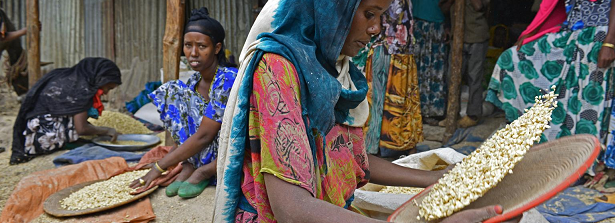
On June 29, 2017 the Food & Business Knowledge Platform, Wageningen UR and the Ministry of Foreign Affairs are organizing a lunch meeting entitled “Transforming Food Systems for Improved Nutrition – How can a food systems approach improve the quality of diets in Africa?”. The Event takes place at the Ministry of Foreign Affairs in the Orange Meeting room (3 E50).
The extent of malnutrition in Africa is large. Household income growth improves people’s ability to afford nutritious foods and diversified diets. However, often this also leads to a nutrition transition and gives rise to new nutritional challenges, including increasing prevalence of overweight/obesity. Addressing nutrition is an investment with high potential returns in terms of reduced health costs, increased productivity, and improved human resource capacity and economic growth. Because of the complexity of the challenges that need to be addressed to attain food and nutrition security, there is a need for a food systems approach, which can foster improvements with sufficient scale and long-term impact.
Lunch meeting
This meeting is one of the activities of the new multi-stakeholder, interdisciplinary knowledge sharing network on food systems.
Objectives
- Foster the understanding among Dutch stakeholders of factors and actors influencing trends in food systems transitions in Africa. Based on the major REKASS publication ‘Achieving a nutrition revolution for Africa’ (see abstract below), which presents an analysis of food systems in various countries of Africa and includes a cross-country analysis.
- Identify which elements of the food systems approach are key to achieve nutrition impact in Africa (including in partner countries of Netherlands)
- Identify knowledge gaps in the ‘food systems’ discourse, analysis, and implementation, which could be further explored by the Dutch ‘food systems’ multi-stakeholder knowledge network.
Programme
12.00 Arrivals and informal networking (incl. light sandwiches lunch)
12.25 Introduction
By Ruerd Ruben, Wageningen Economic Research – WUR, and co-initiator of multi-stakeholder knowledge network on Food Systems (with a/o. Ministry Economic Affairs, PBL, ACWFS, Food & Business Knowledge Platform).
12.30 Transforming Food Systems for Improved Nutrition
By Namukolo Covic, IFPRI Ethiopia and author of ‘Achieving a nutrition revolution in Africa’
- Major findings from ‘Achieving a nutrition revolution in Africa’ report.
- African Union, CAADP, country level policy environment for food system transitions
- The value of a food systems approach: e.g. lessons for nutrition-sensitive agriculture
- Policy interventions, including in agriculture and other sectors
13.00 Response from Netherlands Working Group on Nutrition
By Saskia Osendarp, representing the Netherlands Working Group on Nutrition
13.10 Response from the private sector
By Heleen Bos, Rijk Zwaan
13.20 Facilitated discussion
- Q&A Informative questions to all speakers
- Evidence that counts: how to provide empirical evidence
- Policy and practical interventions that effectively contribute to transforming ‘food systems’
- Wrap-up by chair
– Summary of major ideas
– What has been said about the further (joint) knowledge agenda
14.00 Closure
About the keynote speaker Namukolo Covic
Namukolo Covic was born in 1958 in Choma, Zambia. She has a BSc in Agriculture (1983), an MSc focusing on protein quality evaluation and nutritional toxicology (1988) and PHD in Nutrition (2008). While she completed her PhD she was offered a lecturer position at North-West University, where she became Senior Lecturer from 2007 up to 2015. She led the Food and Nutrition Security Research Programme there within the Centre of Excellence for Nutrition. Namukolo Covic joined IFPRI in 2015 as Research Coordinator in the Poverty, Health and Nutrition Division in Addis Ababa, Ethiopia. She leads Agriculture for Nutrition and Health (A4NH) support to efforts by ReSAKSS to promote evidence-based policy planning and implementation in nutrition, including the promotion of best practices, mutual learning, and policy review and dialogue processes. Her other responsibilities include coordinating the Transform Nutrition Consortium research efforts in East Africa, working closely with other development partners and African Union structures on nutrition and supporting the IFPRI Africa team on policy related nutrition research.
Abstract of ‘Achieving a nutrition revolution for Africa: The road to healthier diets and optimal nutrition’
– By Namukolo Covic & Sheryl L. Hendriks
This report deals with opportunities for making Africa’s food system deliver healthier and more nutritious foods, making these foods more available and affordable to all people, and promoting better food consumption patterns as African economies develop. It presents information and analysis in support of evidence-based policy making that should inform the second generation of CAADP national investment plans now being developed. These investment plans should address not only the usual elements of undernutrition but also widespread micronutrient deficiencies (termed “hidden hunger”) and the growing problem of overweight and obesity that is associated with economic growth. In this report the authors make recommendations on what is needed to achieving a ‘nutrition revolution for Africa’. To make agricultural policy and practice more nutrition-sensitive there is a need to review the agriculture, food, and trade policies to identify reforms necessary to stimulate the local supply and demand of healthy nutritious foods and discourage the consumption of unhealthy foods and food waste. The report further recommends that attaining the goals of the Malabo Declarations on (1) accelerated agricultural growth and transformation for shared prosperity and improved livelihoods and (2) nutrition security through inclusive economic growth and sustainable development will require adopting a deliberate food systems approach. The current policy environment is an important opportunity for shaping the region’s future and ensuring that the much-needed agriculture-led growth and development agenda can simultaneously deliver on improving nutrition, saving lives, improving productivity and health, and curbing nutrition-related diseases and the associated public health expenditures.
More information and registration
For more information about this lunch meeting you can send an e-mail to . If you are interested to participate, please let us know before June 28, 2017.
- This event has passed.

